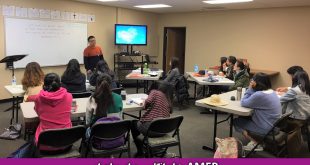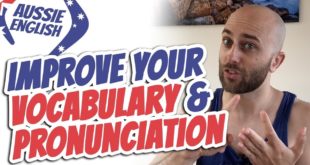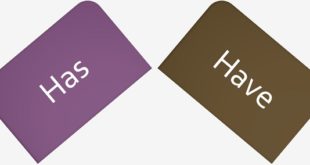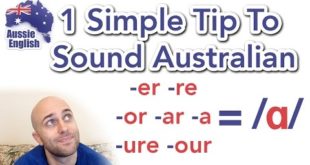So today’s lesson is going to be focusing on muting the T in words and at the ends of words when it’s preceded by an N.
So when you have an N and a T in a word or at the end of words quite often we mute the T in Australian English, and probably other dialects of English as well.
So today we’re going to do a series of exercises guys.
They’re going to be listen then repeat exercises to help you practice your pronunciation of the muted T.
I’m going to say the word with the T. I’m going to say the word with the muted T.
And then I’m going to use the word in a sentence with the muted T.
So, the first set of words is going to be auxilary verbs and modal verbs that are negated.
So, “can’t” becomes “can’-“, “won’t” becomes “won’-“, etc..
Listen and repeat after me guys.
Listen and repeat:
Aren’t.
Aren’-.
They aren’- coming.
Isn’t.
Isn’-.
He isn’- coming.
Can’t.
Can’-.
I can’- help you.
Won’t.
Won’-.
He won’- answer.
Don’t.
Don’-.
I don’- know.
Doesn’t.
Doesn’-.
It doesn’- matter.
Shouldn’t.
Shouldn’-.
It shouldn’- matter.
Wouldn’t.
Wouldn’-.
It wouldn’- matter.
Couldn’t.
Couldn’-.
I couldn’- see.
So now let’s two words that end with N and T.
Listen and repeat:
Bent.
Ben-.
I ben- the wire.
Blunt.
Blun-.
The knife’s pretty blun-.
Elephant.
Elephan-.
There’s an elephan- over there.
Content.
Conten-.
I’m pretty conten-.
Count.
Coun-.
I can coun- to ten.
Dent.
Den-.
Someone put a den- in my car.
Discount.
Discoun-.
Can you hook us up with a discoun-.
Document.
Documen-.
Have you read the documen-.
Faint.
Fain-.
I think I’m in a fain-.
Hunt
Hun-.
Do you guys like to hun-.
Lent.
Len-.
Mum len- me her car.
Paint.
Pain-.
I’m gonna pain- these walls.
Point.
Poin-.
What’s your poin-.
Stunt.
Stun-.
He pulled off a pretty wicked stun-.
So those are words that end in -NT, but now let’s do words that have -NT within them where the T gets muted.
Listen and repeat:
Appointment.
Appoin-men-.
What time’s the appoin-men-.
Absentminded.
Absen-minded.
He’s a little absen-minded.
Enchantment.
Enchan-men-.
Someone’s cast an enchan-men- on me.
Resentment.
Resen-men-.
He’s feeling a little resen-men-.
Stuntman.
Stun-man.
I wish I were a stun-man.
Printer.
Prin-er.
We’re going to need a new prin-er.
Centre.
Cen-re.
I’ll meet you guys at the shopping cen-re.
Counter.
Coun-er.
Put your hands on the coun-er.
Hunter.
Hun-er.
That guy likes to hun- ’cause he’s the hun-er.
Mountain.
Moun-ain.
We’re going to go climb the moun-ain.
Accidental.
Acciden-al.
That was acciden-al.
So, that’s it for today guys. That was one simple tip to sound more Australian.
This is a really common thing for native speakers, at least Australian native speakers of English, to do, and it will definitely help you sound a lot more like an Australian if you practise the pronunciation of -NT as just an N sound, and it will also help you understand and hear when people do this, when native speakers do this, when they’re speaking to you.
Can you think of any other words that end with -NT or have -NT in them where you could mute the T?
 ایرانیان استرالیا Australia Iran بزرگترین جامعه ایرانیان ساکن استرالیا Australia Iran
ایرانیان استرالیا Australia Iran بزرگترین جامعه ایرانیان ساکن استرالیا Australia Iran











